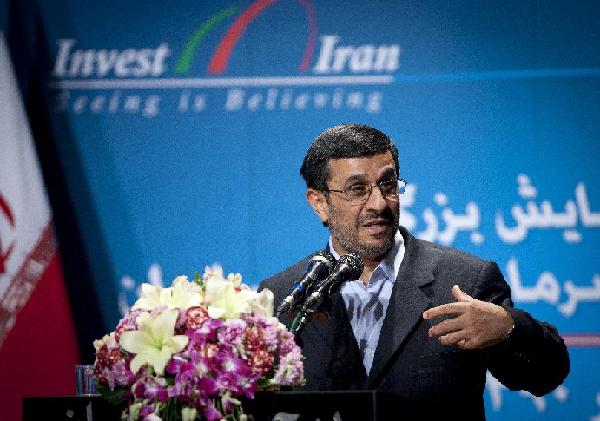Iran opens int'l investment meeting in sanctions
 0 Comment(s)
0 Comment(s) Print
Print E-mail
Xinhua, November 24, 2011
E-mail
Xinhua, November 24, 2011
Iran inaugurated an international investment conference in Tehran on Wednesday amid recent new economic sanctions by the western countries.
 |
|
Iranian President Mahmoud Ahmadinejad speaks at the Iran Investment Summit in Tehran, capital of Iran, on Nov. 23, 2011. Ahmadinejad inaugurated an international investment conference here on Wednesday.The conference, named "Iran Investment Summit", aims to introduce investment opportunities in the country's energy, economic and industrial sectors. [Xinhua] |
Iranian President Mahmoud Ahmadinejad said at the opening ceremony of the conference that Iran is seeking a new economic and political paradigm in its relations with the world.
The conference, named "Iran Investment Summit", aims to introduce investment opportunities in the country's energy, economic and industrial sectors.
Iranian Oil Minister Rostam Qasemi outlined Iran's need for investment in its energy sector and said that 21 oil and gas fields in the country are ready for foreign investments.
Qasemi said that Iran should invest 50 billion U.S. dollars in oil and gas industry annually to maintain its second rank as an oil exporter in the Organization of Petroleum Exporting Countries.
Iran is planning to reduce the sales of raw materials in energy sector and to invest on the relevant products instead, he added.
There are both credit and opportunities for investments in Iran, he said, calling on foreign investors to seize the "unique" investment opportunities in Iran's oil and gas projects.
The Managing Director of Iran's National Petrochemical Company, Abdolhossein Bayat, said on the sidelines of the conference that Iran's petrochemical industry also needs 50 billion U.S. dollars of investment in a 5-year span.
Iran's Minister of Economic Affairs and Finance Shamseddin Hosseini said at the opening ceremony of the conference that "foreign investors in Iran are (like) our countrymen ... and we pave red rugs for them."
Political stability and low risk of investments are the advantages of the Islamic Republic that can encourage foreign investors, said Hosseini.
Foreign investments in Iran saw a 124-percent growth in 2010 in comparison to that in 2008, which shows Iran's seriousness in improving its economic situation, he said.
Iran's national development fund with over 27 billion U.S. dollars of credit is available for the investors, which means they can enjoy 20 percent of the fund and its facilities for their investment projects in the country, he added.
Representatives of 250 international companies from 25 countries are participating in the two-day conference, as several expert panels in oil, gas, petrochemicals, mines, agriculture, banking and insurance are to be held during the event.
Talking to reporters on the sidelines of the conference, Hosseini said that imposing sanctions against the Central Bank of Iran is a "failure" experience for the British government.
He said the issue is a matter of interest for the businesspeople of Britain. If a British businessman finds its interests in dealing with Iran, he will not abandon it, said the Iranian minister.
The United States and its allies Britain and Canada announced Monday new sanctions against Iran's energy, petrochemical and banking sectors, in the wake of a report by the International Atomic Energy Agency that expressed concerns over Tehran's controversial nuclear program.
Britain on Monday severed all links with Iranian banks as part of the country's new financial sanctions against Tehran. According to a statement from the British Treasury, Iranian banks played a crucial role in providing financial services to individuals and entities within Iran's nuclear and ballistic missile programs.
In June last year, the UN Security Council adopted a resolution imposing a fourth round of sanctions against Iran. Soon afterward, the United States, the European Union, Japan, South Korea, Canada and several other countries also placed unilateral sanctions on the Islamic republic.
Large amounts of foreign investments left the country after these sanctions were imposed. Iran says that the sanctions have no serious impact on its economy and the country has managed to circumvent the sanctions.





